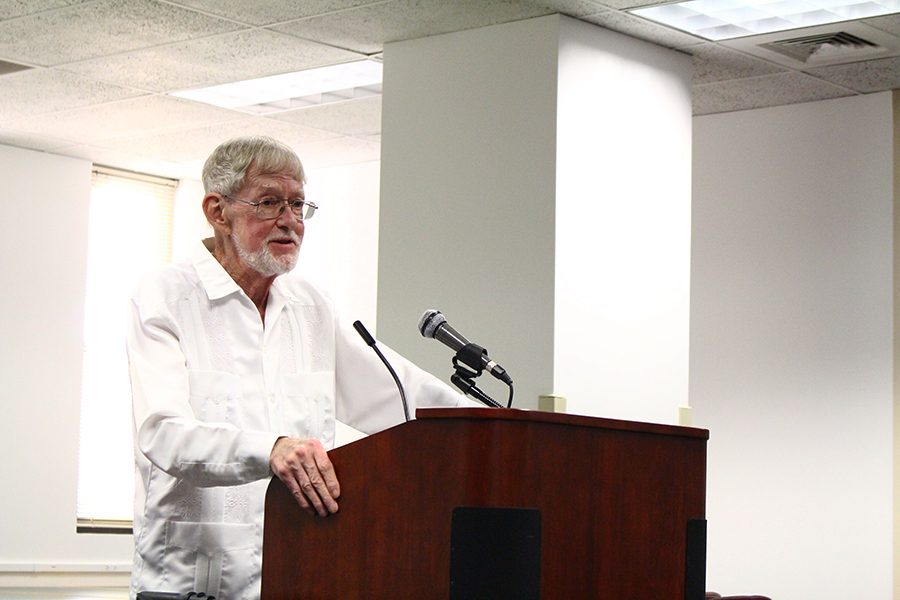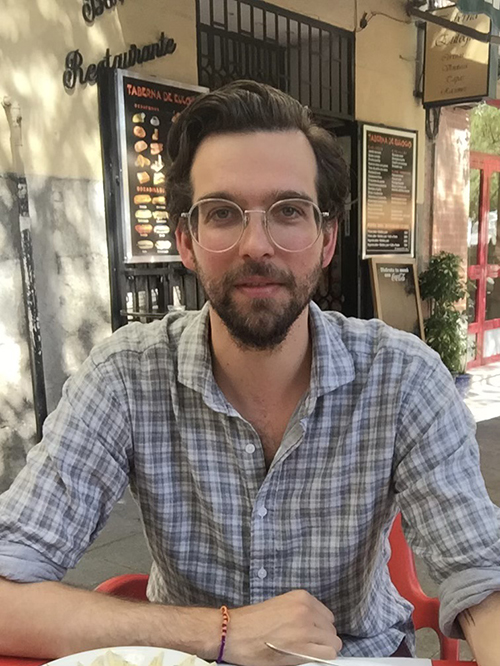Rape, abuse and unequal rights are not things that most people are used to dealing with on a daily basis. Seeking political asylum is not an issue that the average college student usually worries about either.
However, for some people asylum is their only hope. And for others, an entire career has been made out of presenting a case to grant these immigrants refugee status.
Professors and students waited patiently inside a quiet study room in the Love Library Wednesday, Oct. 5 for Thomas Davies to step up to the podium.
Known as the LGBTQ Asylum Warrior, Davies has dedicated his entire life to working on asylum cases.
Davies was a history professor at San Diego State for over 30 years and has donated hundreds of affidavits to the library for research purposes.
He has served as a witness in over 300 cases in support of Latin American immigrants seeking political asylum from torture and abuse in their home countries.
The crowd was mesmerized as Davies talked about his world travels and his passion for law and human rights.
He started in 1959 when he crossed the Mason-Dixon line and traveled to Arkansas for spring break and witnessed blatant racism for the first time.
“My life changed in those 24 hours in Arkansas,” Davies said. He joined the Civil Rights Movement and began to advocate for human rights.
In 1966, Davies headed to Peru. He lived with a family there for two and a half years.
Davies grew accustomed to the culture and became fluent in Spanish. He said he appreciated the culture of Peru despite witnessing extreme poverty and horrible living conditions.
Davies returned to the United States in 1968 with a non-English speaking wife.
They traveled to the University of Texas in 1969 for a Fellowship.
While in Texas, Davies and his wife experienced racism firsthand.
The couple was dining at a restaurant and refused service because they were speaking Spanish.
This occurrence stuck with Davies for many years.
“They thought my wife was Mexican, even though she was Peruvian,” Davies said. “Once they understood that she was, in fact, not Mexican, we were able to get our food.”
This event fueled Davies’ passion for human rights. He went back to Peru in 1977 to find that the country was under dictatorship and in an authoritarian state. Davies witnessed an attempted coup.
“It gave me a close up view of military rule,” he said.
Davies stayed in Peru for 15 months working for the military during the Spanish Civil War.
He found himself in the middle of a political movement and worked on seven case studies of guerilla movements.
In 1992, Davies was contacted by a former student who needed help with a political asylum case with a man who had been tortured in Guatemala.
“This is how I got involved in political asylum,” Davies said. “After all of the (political) work that I’d been doing, it was just a natural progression of my career.”
Davies retired in 2001. These days, he only works on LGBTQ cases in Mexico. He discussed the denial of basic human rights that is still happening in Mexico today.
“Being LGBTQ in Mexico is dangerous,” Davies said. “Passing same-sex marriage laws only made things worse. Mexico cannot provide basic security and it is considered a failed state.”
Davies said the police in Mexico often rape gay individuals and it is not considered a homosexual act. It is common in Spanish culture to have the belief that as long as a man is doing the penetrating, it is not considered homosexuality.
“Every time I think I’ve seen the worst case, it gets worse,” Davies said.
He told the crowd of a case where two boys were raped by their family for a decade until they were finally able to escape from Mexico. They were raped because they “looked feminine.”
“Until the last few years, there has been no protection there,” Davies said.
He went on to discuss the process of receiving a case.
Davies gets a respondent’s affidavit that states why the person deserves political asylum.
He reads it and then continues on to write his own affidavit. He has even received fictional cases.
“Even horror has to be logical,” Davies said.
Davies no longer meets the people in the cases that he works on.
He does this because the first question the government asks him of an LGBTQ case is, “Did he or she sound gay?”
Davies feels that once he meets the immigrant, the government has the opportunity to discredit or disqualify him by asking these questions. Nowadays, Davies goes through a lawyer to avoid these issues.
“We aren’t done yet, but it’s getting better,” Davies said. “Please remember that there are individual people, human beings, that need our help.
Important changes need to happen. You have some promises to keep.”
“It’s still a problem, and it’s going to be a problem for a while,” LGBT studies minor Aria Huerta said. “It’s nice to hear that even people that are outside of the (LGBTQ) community are coming together to help.”
Although the collection of Davies’ past cases can be found at the library, names have been omitted for the sake of the immigrants’ safety.
These are the very affidavits that have been used in United States Immigration Courts for years.
“People are being tortured and threatened in all cases,” Davies said. “You can’t say ‘It’s not my business!’ because it is.”












